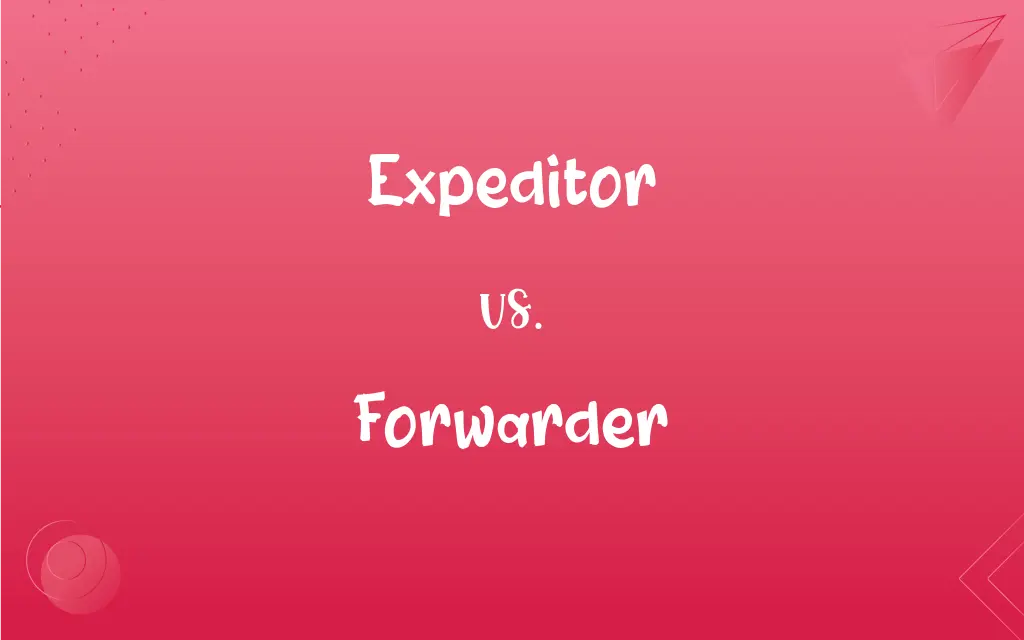Expeditor vs. Forwarder: What's the Difference?
By Harlon Moss & Janet White || Updated on May 22, 2024
An expeditor ensures the timely completion of tasks, often within a supply chain, while a forwarder arranges the transportation and logistics of goods from one location to another.

Key Differences
An expeditor plays a crucial role in ensuring that various tasks and processes are completed on schedule. They often work within manufacturing or supply chain environments to monitor progress, troubleshoot delays, and facilitate the timely delivery of materials and components. On the other hand, a forwarder, or freight forwarder, specializes in the logistics of transporting goods from one place to another. They arrange and manage the entire shipping process, including selecting carriers, preparing shipping documents, and negotiating freight rates.
Expeditors typically work internally within an organization, focusing on the flow of materials and information to meet production deadlines. They are problem-solvers who address any issues that could cause delays in the supply chain. Whereas, forwarders operate externally, working with multiple clients and carriers to move goods across regions or countries. They provide a comprehensive service that includes warehousing, customs clearance, and cargo insurance.
Expeditors ensure internal processes run smoothly and on time, while forwarders handle the external logistics and transportation of goods. Both roles are essential in maintaining efficient and effective supply chain operations.
Comparison Chart
Primary Function
Ensures timely completion of tasks
Manages transportation and logistics
Work Environment
Internal within an organization
External, working with clients and carriers
ADVERTISEMENT
Focus
Production timelines and supply chain flow
Shipping goods from origin to destination
Responsibilities
Monitoring progress, troubleshooting delays
Arranging carriers, preparing documents
Scope
Internal processes
Domestic and international shipments
Expeditor and Forwarder Definitions
Expeditor
Keeps production processes running smoothly.
The expeditor liaised between departments to avoid any production bottlenecks.
Forwarder
Coordinates the shipment of goods.
The forwarder arranged the transport of goods from the factory to the customer.
ADVERTISEMENT
Expeditor
Ensures projects stay on schedule.
The expeditor resolved a delay in the supply chain by coordinating with suppliers.
Forwarder
Handles shipping details and documentation.
As a forwarder, he prepared all necessary export documents for the shipment.
Expeditor
Oversees the timely delivery of materials.
As an expeditor, she ensured all components arrived on time for assembly.
Forwarder
Selects carriers and routes.
The forwarder chose the fastest shipping route to ensure timely delivery.
Expeditor
Focuses on meeting tight deadlines.
He worked as an expeditor to expedite the shipment of urgent orders.
Forwarder
Manages customs clearance processes.
The forwarder dealt with customs to clear the goods for international shipping.
Expeditor
Manages internal logistics.
The expeditor's role is crucial in maintaining the flow of goods within the company.
Forwarder
Provides comprehensive shipping solutions.
The forwarder offered a full range of services, including warehousing and cargo insurance.
Expeditor
To speed up the progress of or execute quickly
Expedite the review of a legal case.
Expedite a loan application.
Forwarder
One that forwards, especially an agent that facilitates and assures the passage of received goods to their destination.
Expeditor
Alternative spelling of expediter
Forwarder
One who, or that which, forwards something to another destination.
Forwarder
One who forwards or promotes; a promoter.
Forwarder
One who sends forward anything;
Forwarder
One employed in forwarding.
FAQs
What is an expeditor?
An expeditor ensures the timely completion of tasks and processes, often within a supply chain.
How does an expeditor differ from a forwarder?
An expeditor focuses on internal timelines and production processes, while a forwarder handles external logistics and shipping.
Where does a forwarder typically work?
A forwarder operates externally, coordinating with multiple clients and carriers to move goods.
What is a forwarder?
A forwarder arranges the transportation and logistics of goods from one location to another.
Where does an expeditor typically work?
An expeditor works internally within an organization, overseeing the flow of materials and ensuring deadlines are met.
Do expeditors work with suppliers?
Yes, expeditors coordinate with suppliers to ensure timely delivery of materials.
What are the main responsibilities of a forwarder?
Arranging transportation, preparing shipping documents, and managing customs clearance.
Can an expeditor handle international tasks?
Yes, expeditors can manage international supply chain tasks, focusing on timely delivery.
Do forwarders handle customs clearance?
Yes, forwarders manage customs clearance as part of their logistics services.
What skills are important for a forwarder?
Expertise in logistics, documentation, and regulatory compliance.
Do forwarders work with multiple clients?
Yes, forwarders work with various clients to arrange the shipment of goods.
What are the main responsibilities of an expeditor?
Monitoring progress, troubleshooting delays, and ensuring timely delivery of materials.
What skills are important for an expeditor?
Strong organizational, communication, and problem-solving skills.
How do forwarders manage logistics?
By coordinating transportation, selecting carriers, and handling shipping documentation.
Is an expeditor involved in production?
Yes, an expeditor ensures production processes stay on track and meet deadlines.
Which role is more focused on internal processes?
The expeditor is more focused on internal processes and timelines.
What industries need forwarders?
Any industry that ships goods, such as retail, manufacturing, and import/export businesses.
How do expeditors ensure timely completion?
By monitoring progress and addressing any delays or issues promptly.
Is a forwarder involved in warehousing?
Yes, forwarders may offer warehousing as part of their logistics services.
What industries need expeditors?
Manufacturing, construction, and supply chain management industries often require expeditors.
About Author
Written by
Harlon MossHarlon is a seasoned quality moderator and accomplished content writer for Difference Wiki. An alumnus of the prestigious University of California, he earned his degree in Computer Science. Leveraging his academic background, Harlon brings a meticulous and informed perspective to his work, ensuring content accuracy and excellence.
Co-written by
Janet WhiteJanet White has been an esteemed writer and blogger for Difference Wiki. Holding a Master's degree in Science and Medical Journalism from the prestigious Boston University, she has consistently demonstrated her expertise and passion for her field. When she's not immersed in her work, Janet relishes her time exercising, delving into a good book, and cherishing moments with friends and family.































































